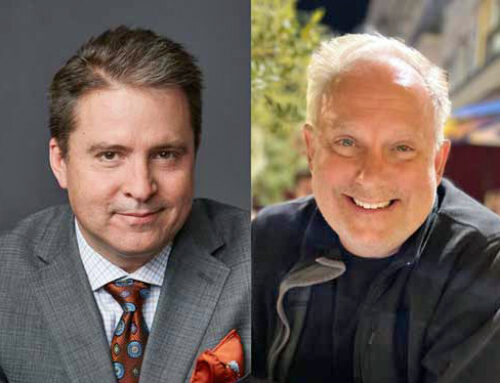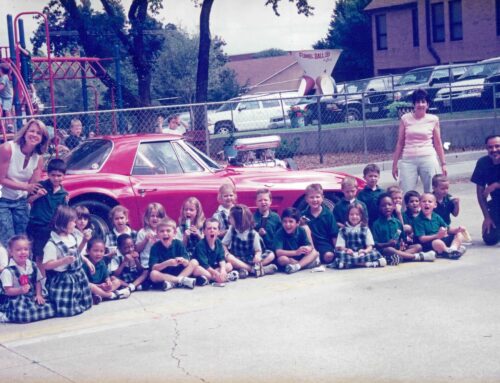They had seen their share of pig races and taken many a stroll down the midway, its distinct odor of fried delicacies compounded by the sticky autumn air. Their daughter had always loved the State Fair of Texas, and Cynthia Salzman Mondell and Allen Mondell were happy to oblige her. It wasn’t until she had grown into a young woman, however, that the husband-wife independent filmmaking team began wondering about the story behind the object of their daughter’s youthful affections — wondering enough, that is, to delve into some serious exploration.
They applied for a research grant in spring 2002 and were given a green light just in time for the fair’s run that fall. But this time, when they passed through the turnstile, everything looked different.
“We came to it not just the way we would have seen it years before that — to have fun, to go to the exhibits. We were there thinking about the personalities, the characters, and why they did what they did,” Allen says.
“We didn’t want to make a film about just corny dogs and candy apples,” Cynthia says. “We felt there was more to it than that.”
It’s this drive to search for meaning and understanding even in the mundane stuff of life that has propelled these neighborhood residents for more than three decades, first as individuals and then as a team. The Mondells formed the non-profit Media Projects Inc. in the late ’70s as a way to raise funds for their projects, with their primary aim to shed light on issues of social concern. The journey since has taken them everywhere from the office of cosmetics guru Mary Kay Ash to women’s restrooms throughout Dallas, from an exclusive patio outside of British Parliament to a trailer park where Half Price Books volunteers taught adults to read.
The work can be adventurous, the Mondells say, but it’s not especially glamorous. Documentary filmmakers such as Michael Moore and Morgan Spurlock may have found a commercial niche, but most filmmakers are nowhere near the mega-million dollar lifestyles of Hollywood. In the Mondells’ case, except for their commissioned museum films, most of their work isn’t commercially profitable, so they have to raise grant money for each project. Plus, the painstaking process of documentary filmmaking requires a great deal of patience. The State Fair of Texas project, for example, dreamed up by the Mondells in 2002, didn’t premiere as “A Fair to Remember” until earlier this year
Then, for the Mondells, there’s the added complication of being married to your business partner and co-director.
“There’s never a time since 1978 that there’s been any difference of opinion. It’s 100 percent cooperation and no arguments,” says Allen, his voice dripping with sarcasm. “Obviously it’s a mixed bag. It puts a lot of stress on a relationship. You’re working together, you’re living together, and then we began to raise a daughter together, but so far it’s worked for almost 30 years.”
Their shared passion for social change certainly helps. Allen defines himself as part of the generation shaped by President John F. Kennedy’s directive to become immersed in public service and his conviction that each person can make a difference. Though Allen never worked in an actual public service job, the belief that something he creates could make a difference in someone’s life forms the foundation of his and Cynthia’s work, he says.
The messages in their films aren’t necessarily overt. In “Louie, Louie: A Portrait in Parkinson’s,” Cynthia captures her own father’s struggle with Parkinson’s disease and reveals the conflicts over caregiving that arose between her and her siblings. The film is used as a resource for other families coping with the same issues.
“It doesn’t tell you how to deal with it; it just sort-of gives you permission to have those feelings and then a discussion guide on how to find help,” Cynthia says.
“Louie, Louie” was the most personal film Cynthia has ever made, but each of the Mondells’ films are rooted in some sort of personal connection. Their latest, “The Monster Among Us,” chronicles the rise of anti-Semitism in Europe and emerged out of letters Cynthia’s brother-in-law has received from Jewish family members in France. Their next project, an exploration of depression and suicide among 15- to 24-year-olds, rose from a tragedy experienced by close friends.
The process of making these films is just as important to the Mondells as the final product. When creating “A Fair to Remember,” they discovered a back story that encapsulates Dallas, its can-do attitude and desire to do everything bigger, better and “with a great deal of panache,” Allen says.
Tracing the fair’s history since 1886, the documentary tells of that inaugural year when the city’s businessmen couldn’t agree on the location and held two separate events. Perhaps this epitomizes Dallas’ stubborn pride, but the business leaders’ decision to consolidate the following year also typifies the city’s spirit of unified determination — even if part of their reasoning had to do with both of those initial fairs losing money.
The film also elaborates on the 1936 Texas centennial, when former Mayor R.L. Thornton offered up $10 million to secure Dallas as the host city. Preparation for the event of the century resulted in much of the art deco murals and architecture that remains at Fair Park to this day. And the Mondells don’t skip over the quirky details — the five-foot tall teddy bear that “drove” a 1910 exhibition Maxwell around the racetrack, the “hootchie cootchie” shows that faded away in the ’60s, and, of course, the origination of corny dogs and candy apples and the carnie families who carry on these legacies.
Gathering all of this material and forming it into a film is a process somewhat like childbirth, Allen says.
“I haven’t physiologically experienced postpartum, but I imagine it’s very much like that,” he says. “You take a long time to work on a film, and one day you have this project in your hand and great, there it is, but what’s most important is what it took to get there.”
Cynthia also has a parental viewpoint, describing each film as “like a child — it has its ups and downs,” but the Mondells agree that though the process is important, there’s nothing like the joy of sharing their “children” with others. They’ve done this for almost 30 years with nearly as many films, and experienced it once again this spring during the release of “A Fair to Remember.”
“What’s wonderful about this film is it resonates with so many people in so many different ways, and that makes those five years worth it,” Cynthia says. “People were coming with their mothers and fathers and grandparents. There are generational memories, something they can relate to that brings that family closer together.
“It’s important what you see on the screen, but it’s also important that you touch people’s souls.”
“A Fair to Remember”
when/ Saturday, Sept. 8, 1 p.m.
where/ Hall of State, Fair Park, 3939 Grand Ave.
cost/ Free; tickets available at the door on a first-come, first-serve basis beginning at noon
for more information/ mediaprojects.org or dallashistory.org
Want to learn more about the Mondells’ projects? Perhaps even share your stories for their films-in-progress? Visit their website at mediaprojects.org.





